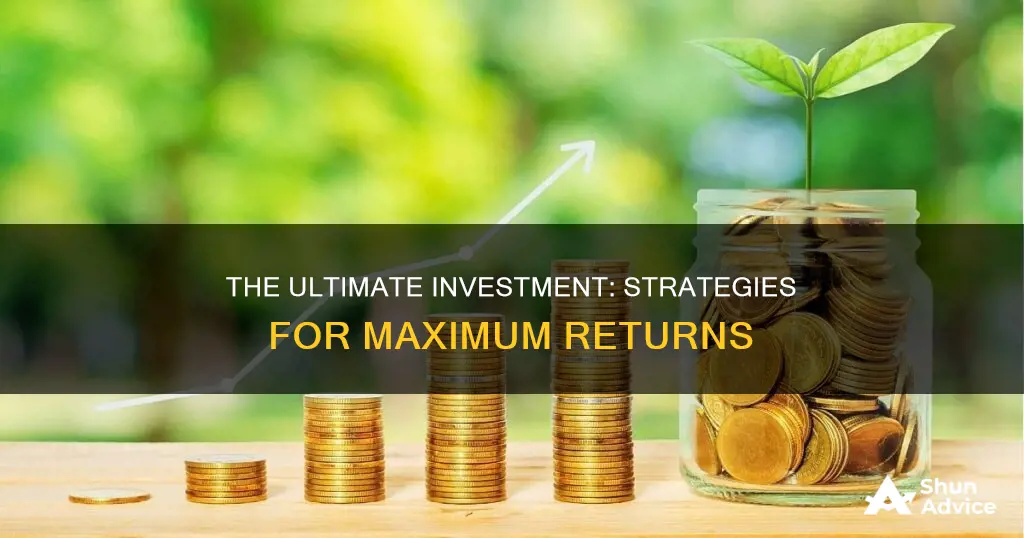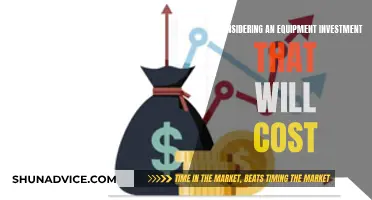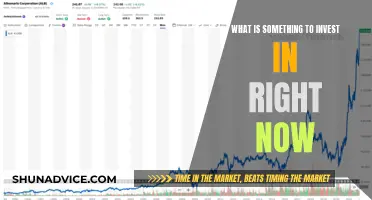
There are many options for investors looking for the highest returns, each with varying levels of risk and liquidity. Here are some of the best investments that can provide higher returns:
1. High-yield savings accounts: Online savings accounts offer higher interest rates than traditional banks and provide easy access to funds, making them ideal for short-term savings or emergency funds.
2. Certificates of Deposit (CDs): CDs are federally insured savings accounts with fixed interest rates for a defined period, usually between 28 days and 10 years. They offer higher interest rates than regular savings accounts but have lower liquidity.
3. Long-term corporate bond funds: These funds invest in bonds issued by corporations and provide higher returns than government or municipal bonds. However, they carry more risk as they are not federally insured.
4. Dividend stock funds: Dividend stocks offer regular cash payouts and potential price appreciation. Dividend exchange-traded funds (ETFs) provide good diversification and the option to receive income monthly, quarterly, or annually.
5. Value stock funds: These funds invest in stocks that are bargain-priced relative to the market and tend to perform better when interest rates rise. They offer higher returns but fluctuate more than safer investments.
6. Small-cap stock funds: These funds invest in stocks of smaller companies with strong growth prospects. While they carry more risk due to the smaller companies' instability, they can provide significant returns over time.
7. Real Estate Investment Trusts (REITs): REITs invest in income-producing real estate or mortgages and are required to distribute at least 90% of their taxable profits as shareholder dividends. They provide diversification and high dividend yields but are vulnerable to real estate cycles and interest rate changes.
8. S&P 500 index funds: These funds are based on the top 500 largest American companies, offering broad diversification and higher returns than more traditional banking products. However, they come with more volatility and are not federally insured.
9. Nasdaq-100 index funds: These funds provide exposure to some of the biggest tech companies and offer higher returns than more conservative investments. However, they can be prone to significant downturns during economic slowdowns.
10. Rental housing: Investing in rental properties can provide regular cash flow and potential appreciation but requires significant initial investment, management expertise, and time commitment.
| Characteristics | Values |
|---|---|
| Type | High-yield savings accounts, Certificates of deposit, Dividend-paying stocks, Bonds, Mutual funds, Index funds, Exchange-traded funds, Stocks |
| Risk level | Low to high |
| Returns | Low to high |
| Time horizon | Short to long-term |
| Accessibility | Accessible to virtually anyone |
What You'll Learn

High-yield savings accounts
- Interest rate: Look at the rate currently being offered and how long it lasts. Some banks offer promotional rates that might expire after a few months and then drop down to a lower rate.
- Initial deposit: Some banks require a deposit to open a high-yield checking account, ranging from $5 to $100 or more.
- Minimum balance: Check the fine print to learn the minimum balance required to avoid service fees and earn the maximum APY.
- Fees: Many high-yield savings accounts have no fees, but some do. Make sure you know the fee structure before opening an account.
- Compounding interest: Find out whether interest is compounded daily, monthly or yearly, as this can make a big difference in how quickly your money grows.
It's also worth noting that high-yield savings accounts are generally offered by online banks, which have lower operating costs than traditional, brick-and-mortar banks. This allows them to offer higher interest rates and lower fees. However, this also means that you might not find as many products at online banks, and you won't have the option of in-person service.
Overall, high-yield savings accounts are a great option for those who want to earn a higher interest rate on their savings while still having flexible access to their money.
Venture Capital: The Allure of High-Risk, High-Reward Investing
You may want to see also

Long-term certificates of deposit
When you open a CD, you agree to keep your money in the account for a specific period, which can range from 28 days to 10 years. In exchange for a higher interest rate, your funds are tied up for a set period, and early withdrawal may result in penalties. The longer the term, the higher the interest rate tends to be. However, it's important to note that CDs carry reinvestment risk, which means that if interest rates fall, you may earn less when you reinvest your money in new CDs with lower rates.
- America First Credit Union: Offers a wide range of CD terms between three and 60 months, with highly competitive rates. It also offers specialty CDs, such as bump-rate CDs and flexible CDs, with low minimum opening deposits.
- Vio Bank: Provides traditional CDs with terms ranging from six months to 10 years, giving you an extensive variety of options. The minimum deposit for each account is relatively low at $500.
- Popular Direct: An online bank offering CDs with terms ranging from three months to five years, ideal for serious savers. While it offers competitive rates, it requires a minimum deposit of $10,000 to open an account.
- Synchrony Bank: Offers a range of regular CDs, from three months to five years, as well as no-penalty CDs and bump-up CDs. Synchrony Bank also provides IRA CDs, and there is no minimum opening deposit.
- Marcus by Goldman Sachs: Features a competitive yield on its CDs, with terms ranging from six months to six years. It also offers no-penalty CDs and rate-bump CDs, with a minimum deposit requirement of $500.
- Sallie Mae Bank: Provides 11 CD terms, a savings account, and money market account. It offers competitive yields, with a minimum deposit requirement of $2,500.
- Quontic Bank: Offers six CD terms, ranging from three months to five years, with a minimum deposit of $500. Quontic pays competitive rates and has lower minimum deposit requirements compared to some other banks.
- Barclays Bank: An online bank that offers CDs with terms ranging from six months to five years. Barclays does not require a minimum opening deposit, making it accessible to anyone looking for a fixed yield.
- Capital One: Provides CDs with terms as short as six months and as long as five years, with no minimum opening deposit. Capital One's CDs are a good choice if you want flexibility and the option to choose from a variety of terms.
- Citizens Access: Offers six CD terms, ranging from one year to five years, with a minimum deposit requirement of $5,000. Citizens Access provides competitive yields, but it no longer offers a no-penalty CD option.
Maximizing Military Retirement Pay: Strategic Investment Options
You may want to see also

Dividend-paying stocks
- Exxon Mobil
- Johnson & Johnson
- Verizon Communications
- Altria
- Comcast Corp
- Medtronic
- Duke Energy
- Starbucks
- PNC Financial Services
- Kinder Morgan
Deadly Investments: The Human Cost
You may want to see also

Rental real estate
Getting Started with Rental Properties
Firstly, you will need to identify the right property and prepare to finance it. When choosing a profitable rental property, look for a location with low property taxes, good schools, and walkable amenities such as restaurants and parks. A growing population or a neighbourhood with a revitalisation plan can also signal a good investment opportunity. Online platforms like Zillow, Airbnb, Trulia, and Realtor.com can provide valuable information on rental rates and property values.
The financing process for a rental property is similar to that of a primary residence mortgage but with some key differences. Lenders typically charge higher interest rates on rental properties due to a higher rate of default. Underwriting standards are usually stricter, with a focus on credit score, down payment, and debt-to-income ratio. A higher down payment of 15% to 25% is generally required for investment properties.
Managing Your Rental Property
Once you have acquired your rental property, you will need to decide whether to manage it yourself or hire a property management company. Managing it yourself will require a broad array of knowledge, from basic tenant law to property maintenance skills. If you opt for a property management company, they can assist with maintenance, tenant screening, and rent collection, but this will reduce your overall profit.
Pros of Rental Real Estate Investment
- Passive income: Rental properties can provide a steady, passive income stream, allowing you to earn while working a regular job.
- Potential for capital appreciation: If real estate values increase, the value of your investment rises as well.
- Tax advantages: Rental income is not subject to Social Security tax, and the interest on an investment property loan may be tax-deductible.
- Tangible asset: Real estate is a physical, tangible asset, providing a sense of security.
Cons of Rental Real Estate Investment
- Time and money commitment: Maintenance costs and property management expenses can decrease your rental income, and you should be prepared for unexpected repairs and emergencies.
- Illiquidity: Real estate is not a liquid asset, and it may take time to sell your property if needed.
- High entry and exit costs: The upfront costs of acquiring a rental property can be significant, and there may be ongoing costs associated with maintenance and property management.
- Risk of vacancy: There is always the possibility of a tenant moving out, leaving you with monthly expenses to cover.
Alternative Options
If you are hesitant about the commitment and potential risks of owning a rental property, there are alternative ways to invest in real estate. You can consider real estate investment trusts (REITs), which are companies that own commercial real estate, and you can invest in them through a brokerage account. Another option is to use online real estate investing platforms, which connect investors to real estate projects. These platforms often require a higher initial investment and are open only to accredited investors.
Uber: Invest or Avoid?
You may want to see also

Investment platforms
Fidelity Investments
Fidelity offers a range of investment vehicles, including Self-Directed Trading and Robo Portfolios. Self-Directed Trading has no account minimum and zero commission fees for stock, ETF, and options trades. Robo Portfolios, on the other hand, have a $100 minimum deposit and no management fees. Fidelity also provides a wide range of educational resources, including articles and charts, to help investors make informed decisions.
Charles Schwab
Charles Schwab offers both a traditional brokerage account and a robo-advisor platform. The brokerage account has no account fees and zero commission fees for stock and ETF trades. The robo-advisor platform, Schwab Intelligent Portfolios, has a $5,000 minimum deposit and offers a no-fee automated service. Charles Schwab also stands out for allowing investors to purchase fractional shares of stock, making it more accessible for everyday investors.
E*TRADE
E*TRADE is a good option for beginner investors, offering mutual funds and ETFs with no transaction fees or commissions. It also has a robust educational library with in-depth articles and videos. E*TRADE's Core Portfolios robo-advisor platform requires a minimum deposit of $500 and charges a 0.30% annual advisory fee.
Robinhood
Robinhood was one of the first brokers to offer zero-commission trading and has no minimum deposit requirements. Investors can access a wide range of investment options, including stocks, options, ETFs, cryptocurrencies, and IPO shares. Robinhood also offers a retirement account with a 1% match and no cap. However, it does not offer mutual funds or bonds.
Vanguard
Vanguard is known for its low-cost investing options and is a good choice for investors looking for long-term holdings. It offers zero commission fees for stock and ETF trades and no transaction fees for over 3,000 mutual funds. Vanguard also provides retirement planning tools and excellent customer service. However, it has a basic trading platform and lacks robust research and data tools.
Other Platforms
Other notable investment platforms include Ally Invest, which offers a range of investment options and educational resources, and UFB Secure Savings, which offers up to 5.25% APY on savings accounts with no monthly fee. Chime is another online-only platform that minimizes fees and offers early direct deposits.
Best Etoro Investments Today
You may want to see also
Frequently asked questions
Some safe investments that pay monthly income include savings accounts, certificates of deposit, annuities, bonds, dividend stocks, rental real estate, and real estate investment trusts (REITs).
Some higher-risk, higher-return investments include stocks, mutual funds, index funds, and exchange-traded funds (ETFs).
When choosing an investment, it's important to consider your risk tolerance, time horizon, knowledge of investing, financial situation, and how much you can invest.
Some of the best investments for beginners include high-yield savings accounts, certificates of deposit (CDs), government bonds, and dividend stocks.
It's recommended to consult a financial advisor or planner to help you create a financial plan that is tailored to your goals and risk tolerance.







